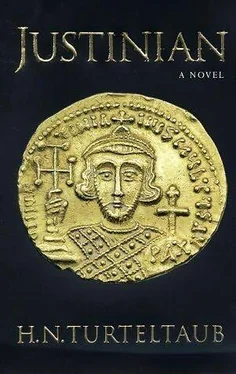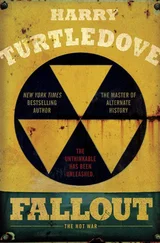Harry Turtledove - Justinian
Здесь есть возможность читать онлайн «Harry Turtledove - Justinian» весь текст электронной книги совершенно бесплатно (целиком полную версию без сокращений). В некоторых случаях можно слушать аудио, скачать через торрент в формате fb2 и присутствует краткое содержание. Жанр: Историческая проза, на английском языке. Описание произведения, (предисловие) а так же отзывы посетителей доступны на портале библиотеки ЛибКат.
- Название:Justinian
- Автор:
- Жанр:
- Год:неизвестен
- ISBN:нет данных
- Рейтинг книги:3 / 5. Голосов: 1
-
Избранное:Добавить в избранное
- Отзывы:
-
Ваша оценка:
- 60
- 1
- 2
- 3
- 4
- 5
Justinian: краткое содержание, описание и аннотация
Предлагаем к чтению аннотацию, описание, краткое содержание или предисловие (зависит от того, что написал сам автор книги «Justinian»). Если вы не нашли необходимую информацию о книге — напишите в комментариях, мы постараемся отыскать её.
Justinian — читать онлайн бесплатно полную книгу (весь текст) целиком
Ниже представлен текст книги, разбитый по страницам. Система сохранения места последней прочитанной страницы, позволяет с удобством читать онлайн бесплатно книгу «Justinian», без необходимости каждый раз заново искать на чём Вы остановились. Поставьте закладку, и сможете в любой момент перейти на страницу, на которой закончили чтение.
Интервал:
Закладка:
MYAKES
Well, Brother Elpidios, I have to say Justinian is right when he talks about himself so. Up till Eudokia died, he could be playful every now and again, but not afterwards, not for years and not until a lot of water had flowed under the bridge. When he lost her, he lost something special, something he couldn't find anywhere else.
Me, Brother? Yes, I liked Eudokia pretty well. Can't say I was what you'd call close to her. That wouldn't have been fitting, not with another man's wife. But she treated me- she treated all the excubitores- like flesh and blood, not like part of the furniture. She was a soldier's daughter herself, you'll remember. That probably helped.
What? Did I upbraid and exhort Justinian to pay poor Epiphaneia more heed? You don't upbraid and exhort the Emperor of the Romans. I mentioned her once or twice. Every time I did, he gave me a look fit to freeze my marrow. I'm not stupid. I got the idea, and shut up.
Emperor of the Romans though I was, the world did not stop turning because of my sorrow. Abimelekh eventually responded to Mansour's question. Paul the magistrianos brought me that response, along with Mansour's graceful expression of consolation and condolence, which I listened to although I did not much want to hear it.
"Mansour says Abimelekh says he will accept a partial resettlement of the Mardaites\a160… provided it includes at least twenty thousand men of fighting age," Paul reported, his tone going from sympathetic to cold and sardonic in the space of a sentence.
"Good heavens," I said, "he wants us to take away the substance and leave behind only the shadow. I doubt the Mardaites have more than twenty-five thousand men under arms all along our border with the Arabs."
"Exactly so, Emperor," the magistrianos replied. Had I not been Emperor of the Romans and he, like everyone else within the Empire, my servant, I have no doubt that, instead of agreeing, he would have said I told you so.
"He asks too much," I said. "He is the one who wants this treaty, not I. Tell Mansour the war goes on if that number does not come down." Paul bowed and departed. I had no doubt he would convey my words exactly as I intended, for I meant every one of them. I was ready- I was more than ready- to hurl Leontios into Armenia once more. If Abimelekh wanted to avoid more war, he could meet my terms.
And the numbers did come down. Paul and Mansour haggled like a couple of old women trying to get the better of each other over the price of a sack of beans. At last, Paul came to me, reporting, "He is down to fourteen thousand, Emperor. I had hoped for twelve, but-"
"Tell him twelve thousand or war," I said. "If you hoped for that, we shall have it."
And we did have it. Faced with that bald choice, Mansour capitulated. Paul and Mansour having drawn up the terms of the treaty, I signed two parchments in scarlet ink and affixed my seal to each of them. Paul then accompanied Mansour to Damascus, where Abimelekh, observing virtually the same ceremonies I had, also signed and sealed both copies of the treaty. He kept one and sent the other back to this imperial city with the magistrianos, to whom he had shown every honor while Paul was in Damascus.
Also accompanying Paul on the road back from Damascus was the first year's payment of the new tribute: fifty-two thousand gold nomismata, more than seven hundred pounds of gold. Some of the coins were old Roman mintings, dating from before the days when the Arabs stole Syria and Palestine and Egypt from us. Some were newer, obtained from us in trade. And some were their own issues, imitating ours. But all were of the same weight and purity, as the treaty had specified. Seeing them, I felt like Midas in the pagan myth.
The treaty having been completed, both Abimelekh and I sent messengers to the chieftains of the Mardaites, ordering them to assemble at Sebasteia, in the eastern part of the military district of the Armeniacs, for resettlement. Several of the messengers did not return. Some of them were returned to officials of the misnamed commander of the faithful and to my own officers- in pieces. The Mardaites were convinced the orders they had received were a trick on Abimelekh's part to lure them from their mountain fastnesses and destroy them. And, I daresay, had the Arab thought of such a ploy, he would have used it.
Paul the magistrianos and several of my other advisers were almost jubilant on account of the Mardaites' intransigence: if my plans failed, they would regain lost influence. But I did not intend to fail. Summoning Paul and the others, I said, "I will travel to Sebasteia myself. If the Mardaites know I am there, they will not be afraid to go there themselves. Let word of my journey go forth."
Word went forth, and, in due course, so did I. Up till then, I had never traveled far from Constantinople. Oh, I had been out of the imperial city now and again, once or twice visiting Philaretos by the Long Wall and often crossing the Bosporos to hunt in Asia, but my life had revolved around the palace, the court, and the city.
I was anxious to leave for more reasons than one. Not only did I want to see more of the Empire I ruled, but I was also eager to leave Constantinople behind for a while, to escape the memory of Eudokia. And so, riding my own horse rather than traveling in a cart or horse-drawn litter, I set off across Anatolia for Sebasteia.
Until you have seen more than your own home, you do not understand even that home, for you have nothing with which to compare it. So I discovered in this journey. I knew Constantinople was the greatest city in the Roman Empire. Knowing that, I expected other cities to be very much like the city, but smaller. It was not so, I saw. Most of the towns along the way to Sebasteia were hardly more than fortresses, strongpoints from which to defend the local countryside. Ruins around the walls said many had once been more than that, but how can a town survive, how can its hinterland feed it, when it is continually oppressed by war, as the towns of Anatolia had been since the Persian invasions in the reign of Phokas a long lifetime before?
So much of the countryside, both in the coastal lowlands and in the plateau that makes up the heart of Anatolia, was also all but empty. Save for the soldiers settled on the land in the military districts in exchange for their service in time of need, broad tracts of what should have been good crop- and pastureland had no farmers or herders on them. Who would want to, who would be mad enough to, work land that would surely be despoiled by an invader in a few years' time?
But the land needed to be worked, for the sake of the towns and for the sake of the fisc. The Mardaites whom I would meet in Sebasteia would not be nearly enough to fill these broad territories, and, in any case, I had more urgent need for them in Europe. Still, I resolved that, if ever I had more folk to resettle, I would put them in Anatolia.
Sebasteia lies just north of the Halys River, a dusty fortress of a place much like the other dusty fortresses I had seen. But when I was riding down the road from Sebastopolis and Siara and first drew near Sebasteia, I cried out in wonder, saying, "Have they given their fields over to flowers?" For the precincts surrounding the town were awash with bright colors, reds, and blues and golds and greens, as splendid a sight, and as unexpected a splendor, as I have ever found.
They were not flowers. They were, as I discovered on coming closer, the tents of the Mardaites. Twelve thousand warriors and their families are not just an army; they are a city. And all that city did me honor as I rode through it, men in white robes and others in rusty mailshirts prostrating themselves in the dirt and shouting my praises in Greek, in Arabic, in Armenian, and Persian, and, for all I know, in other tongues as well.
Читать дальшеИнтервал:
Закладка:
Похожие книги на «Justinian»
Представляем Вашему вниманию похожие книги на «Justinian» списком для выбора. Мы отобрали схожую по названию и смыслу литературу в надежде предоставить читателям больше вариантов отыскать новые, интересные, ещё непрочитанные произведения.
Обсуждение, отзывы о книге «Justinian» и просто собственные мнения читателей. Оставьте ваши комментарии, напишите, что Вы думаете о произведении, его смысле или главных героях. Укажите что конкретно понравилось, а что нет, и почему Вы так считаете.












